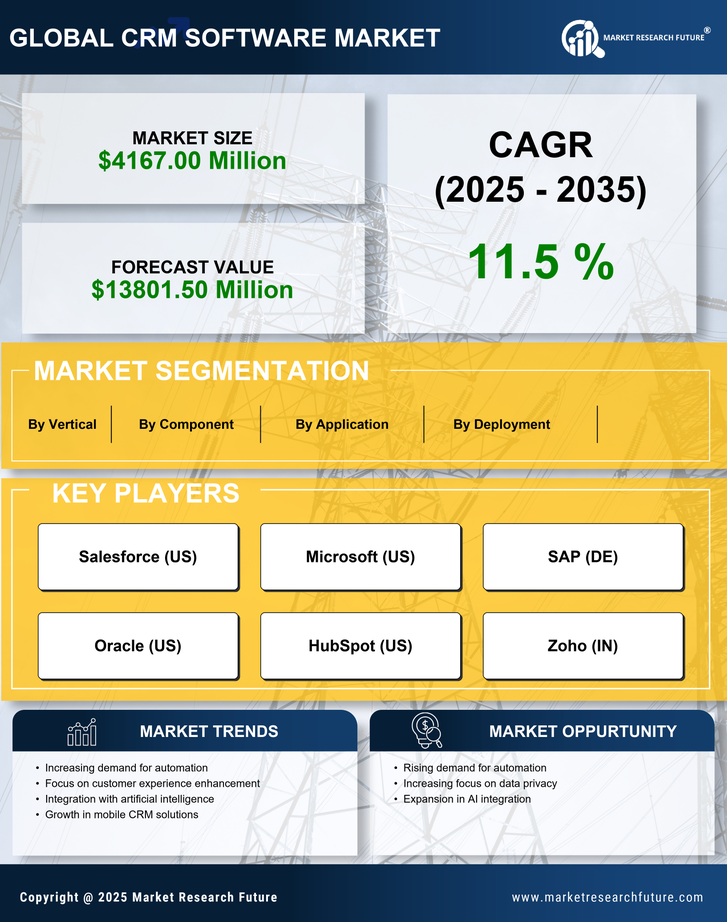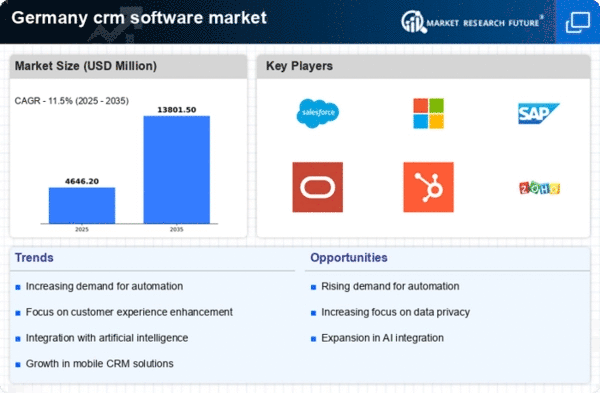The crm software market in Germany is characterized by a dynamic competitive landscape, driven by rapid technological advancements and evolving customer expectations. Major players such as Salesforce (US), SAP (DE), and Microsoft (US) are at the forefront, each adopting distinct strategies to enhance their market presence. Salesforce (US) continues to innovate with its cloud-based solutions, focusing on AI integration to improve customer engagement. SAP (DE), leveraging its strong local presence, emphasizes regional customization and integration with existing enterprise solutions. Meanwhile, Microsoft (US) is expanding its offerings through strategic partnerships, enhancing its Dynamics 365 platform to cater to diverse business needs. Collectively, these strategies contribute to a competitive environment that is increasingly focused on innovation and customer-centric solutions.
In terms of business tactics, companies are increasingly localizing their offerings to better meet the specific needs of the German market. This localization often involves optimizing supply chains and enhancing customer support services. The market structure appears moderately fragmented, with a mix of established players and emerging startups. The influence of key players is substantial, as they set benchmarks for service quality and technological capabilities, thereby shaping customer expectations and competitive dynamics.
In October 2025, Salesforce (US) announced a significant partnership with a leading German telecommunications provider to enhance its service delivery capabilities. This collaboration is expected to streamline customer interactions and improve data security, which is increasingly critical in the current regulatory environment. The strategic importance of this partnership lies in its potential to bolster Salesforce's market share in Germany by leveraging local expertise and infrastructure.
In September 2025, SAP (DE) launched a new suite of tools aimed at small and medium-sized enterprises (SMEs), designed to simplify the implementation of crm solutions. This initiative reflects SAP's commitment to democratizing access to advanced technology, allowing smaller businesses to benefit from sophisticated customer relationship management without the need for extensive resources. The launch is strategically significant as it positions SAP to capture a growing segment of the market that has been historically underserved.
In November 2025, Microsoft (US) unveiled enhancements to its Dynamics 365 platform, incorporating advanced AI features that facilitate predictive analytics for sales teams. This move is indicative of a broader trend towards integrating AI into crm solutions, enabling businesses to make data-driven decisions more effectively. The strategic relevance of this enhancement lies in its potential to differentiate Microsoft from competitors by offering superior analytical capabilities that can drive sales performance.
As of November 2025, the crm software market is witnessing trends such as increased digitalization, a focus on sustainability, and the integration of AI technologies. Strategic alliances are becoming more prevalent, as companies recognize the value of collaboration in enhancing their service offerings. Looking ahead, competitive differentiation is likely to evolve, shifting from price-based competition to a focus on innovation, technological advancement, and supply chain reliability. This transition suggests that companies that prioritize these areas will be better positioned to thrive in an increasingly competitive landscape.

















